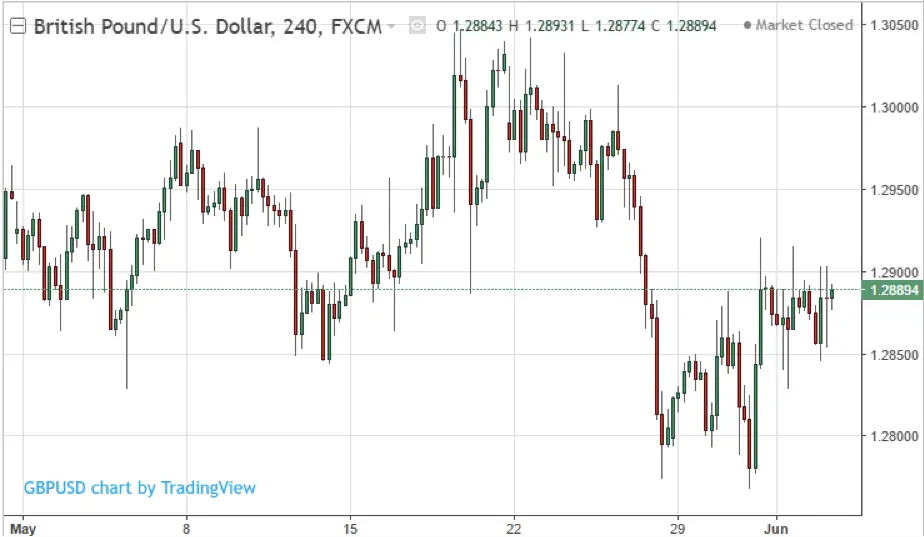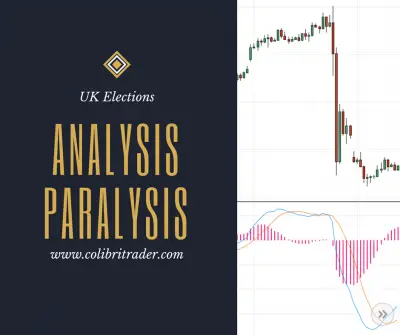This is a Guest Post by: Colibri Trader @priceinaction. This article is used here with permission and originally appeared here on ColibriTrader.com.
When British Prime Minister Theresa May announced that the government plans to hold early general elections on June 8th, the markets were hit by surprise. Next general elections were not due to take place until the next three years, in May 2020. May wants to strengthen the Conservative party’s position ahead of the two-year “Brexit” negotiations, which the markets considered a positive move for the British economy.
by: Colibri Trader
Right after the announcement, the British pound rocketed to a 6-month high against the US dollar, which is a solid 2% gain, hitting the target of $1.29 by the end of the trading day. During most of May, sterling traded in a range between $1.2760 and $1.3050, but moved back below $1.30 shortly after.
 Figure 1: The GBP/USD exchange rate during May
Figure 1: The GBP/USD exchange rate during May
However, the main market reaction will come after the results of the election are published. Right after the snap election announcement at Downing Street, investors were convinced that Tories will make the race against the opposition Labour party – a view that is becoming less clear in the recent polls. Recently, YouGov, one of UK’s best-known polling companies, published a survey that put May just four points ahead of Jeremy Corbyn, her main rival. In any case, whether the markets have already priced in an eventual victory of May remains unclear, so let’s take a look at various election outcomes and how they could move the markets and the British pound.
If May wins, the majority in the House of Commons will significantly impact the markets.
Five out of six UK’s best-known polling companies – ICM, Ipsos MORI, ComRes, Opinium and Survation -predicted two weeks ago that the Tories are going to win a significant majority in the 650-member House of Commons. Survation recently revised its predictions, putting the two main  parties neck to neck, with 40% for the Conservatives and 39% for the Labour party. Will the Conservatives manage to increase their majority?
parties neck to neck, with 40% for the Conservatives and 39% for the Labour party. Will the Conservatives manage to increase their majority?
According to RCB’s Adam Cole, a 125 seat majority is “a fair reflection of what the markets are priced for,” while any majority less than 100 seats “would probably be seen as disappointing and pound negative.”
Nomura’s Jordan Rochester has a slightly different view. He predicts that “a majority of more than 50 seats could lead the currency slightly higher,” while a majority of less than 30 seats could cause the sterling to fall 1% as “the market would lower the smooth Brexit pricing probability.”
Mizuho’s Neil Jones has a similar view as Rochester, stating that any majority less than 35 seats could trigger a “serious sell-off”, and less than 20 seats would be “a red alert” for the sterling.
The most pound negative would for sure be a majority which is close or lower to the current majority that May’s party has. According to MUFG’s Lee Hardman, this threshold is a 17 seats majority, which would heighten the “uncertainty over the Brexit outlook.” This is especially true when taking into account May’s recent statement that “no Brexit deal is better than a bad Brexit deal” – a stance on which investors are likely raising an eyebrow.
The most likely scenario is that UK’s position on a more favourable “Brexit” deal remains the same  as before the elections, disappointing the markets and sending the pound lower. Investors should focus on the bigger picture, with the British economy sending mixed signals regarding its state. The United Kingdom released a series of monthly and quarterly economic indicators in May, which show that the country has still not entered positive growth terrain. While PMI for manufacturing, construction and services showed that purchasing managers are confident in the economy, which are reported at 57.3, 53.1 and 55.8 (all above the 50 points threshold), the actual manufacturing production shrunk by 0.6% month over month. Furthermore, retail sales increased by 2.3% vs a 1.2% forecast, while the second estimate GDP for the previous quarter rose only 0.2% – lower than expected 0.3%.
as before the elections, disappointing the markets and sending the pound lower. Investors should focus on the bigger picture, with the British economy sending mixed signals regarding its state. The United Kingdom released a series of monthly and quarterly economic indicators in May, which show that the country has still not entered positive growth terrain. While PMI for manufacturing, construction and services showed that purchasing managers are confident in the economy, which are reported at 57.3, 53.1 and 55.8 (all above the 50 points threshold), the actual manufacturing production shrunk by 0.6% month over month. Furthermore, retail sales increased by 2.3% vs a 1.2% forecast, while the second estimate GDP for the previous quarter rose only 0.2% – lower than expected 0.3%.
Despite the pound being relatively undervalued according to long-term valuation models, like the PPP, the British currency could fall even further after the election results are published. According to analysts, who believe the market has already priced in a 125 seat majority for the Tories, anything less will probably be negative for the pound in the near-term. Last week’s polls suggest that a majority of approximately 40-50 seats is the consensus to expect. If those projections show to be true – along with the mixed economic indicators and slower than expected economic growth that the UK is facing – we could see the pound breaking below the last year’s December high of $1.2770 and probably reaching as low as $1.25, a level right before May’s snap election announcement.
In the event of a surprise Labour victory, market’s reactions could be very similar to an eventually narrow win of the Tories. The currency market has already experienced a heavy buying of put options, with investors concerned over the narrowing lead of the Conservatives. According to Colin Cieszynski, a win of the Labour party would hit not only the pound, but also the stocks worldwide. “Labour’s far-left, out-of-the-’70s program could create economic uncertainty and send global stocks into a tailspin,” he told MarketWatch. “As we enter the weaker season of the year for stocks, which runs through mid-October, it wouldn’t take much to tip over the current house of cards.”
On the other side, the FTSE 100 index would probably be benefiting from a weaker pound in this case, as the weaker currency boosts overseas earnings of the index’s heavyweight multinational companies. The pound “may trend the same way as indices outside the U.K., and the FTSE could break ranks and go the other way,” Cieszynski concluded.
UK Elections: Possible Scenarios:
1. What will happen if May wins
Despite the recent polls suggesting that May’s lead over Corbyn is narrowing, a win of the Conservatives is still the most likely outcome and what the markets are anticipating. In this case, the majority in the Parliament that May is going to get will determine the market reactions of the election.
A majority of more than 125 seats would send positive signals to investors ahead of the “Brexit” negotiations. The pound could rise above $1.30 – its long-term PPP target – but the stock-market would be hit by a stronger currency. Anything between a 70 to 125-seat majority, which is already priced in the market, will probably be neutral for the markets. A majority of less than 70 seats could see the British pound falling and the UK’s benchmark stock-index – FTSE100 – rising in value. British multinational firms are benefiting from a weaker currency as their overseas earnings will be worth more in sterling.
2. What will happen if Corbyn wins
A less likely scenario, an eventual win of May’s main competitor, Jeremy Corbyn, would send shockwaves through the markets. His economic plan is considered outdated, and his proposed tax-reforms would hit UK’s business environment. A surprising victory of the Labours would be bearish for the pound, which could slide as low as $1.25, while any disadvantages of his market reforms on the stock market would be erased by a surge in overseas earnings in the medium-term. I suspect a neutral outlook for the FTSE100.
3. Alternative scenario
The third scenario, and one which has quite a chance to show to be true, is that the UK’s election on Thursday will make no big difference to the markets. The polls are suggesting a head to head race and May’s previous advantage over the opposition seems to have disappeared. Just for reminder – the aim of the election was to increase May’s majority in times when she still had a substantial advantage over the Labours. An election result which is close to the present majority in the House of Commons would disappoint investors, triggering a major sell-off in the sterling. The only bright side would be UK’s stock market – which, as said earlier, rises on a weaker pound.
UK Elections: CONCLUSION
Whatever the outcome of the elections, traders are better off not to trade on the UK’s election on June 8th. Uncertain results and high price volatility can shake traders out of positions quickly, as well as broaden trading spreads on pairs involving the British pound. After the dust settles, the pound’s direction will become clearer and institutional investors will start to enter positions based on the election results.
P.S.
Check out my recent technical analysis article HERE
In a week like this, it might be best to trade on a trading simulator, register for a free one HERE
For anything else, do not hesitate to contact me on: [email protected]
For more articles by Colibri Trader check him out here on ColibriTrader.com and follow him on twitter @Priceinaction.